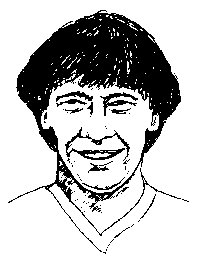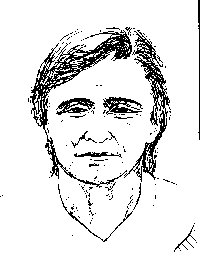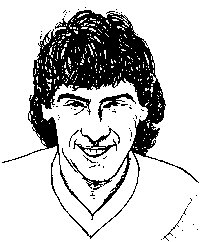
| Tommy Langley |
The name of Tommy Langley has become like some jaded comedian's meaningless catch phrase, a cheap way to get a laugh, but I am prepared to defend him nonetheless. His playing style epitomised Palace's collective approach for the whole season, with endeavour being the only quality in evidence, and with few results. Although he only scored three goals all season no one has tried harder than Langley did for Palace, and for that at least he deserved praise rather than the vilification he received. To say that he was simply useless doesn't tell the whole story, because he was a player who had been extremely good as a youngster at Chelsea and he knew that he wasn't doing himself justice with his performances at Palace. It must be very frustrating for a striker in particular when he knows that he can do so much better, and since goals are such a clear measure of success or failure it is easy to lose confidence completely. Langley chased everything, but there was little purpose to Palace's play and it was hard to tell what role he was being asked to perform, since he lacked the strength of a classic centre-forward; his partner Walsh was similarly lightweight, and with Clive Allen having returned to QPR to rejoin Venables there was now nobody in the team who knew where the goal was. The deal which took Allen to QPR involved Steve Wicks - a central defender - moving the other way, and this was another bit of transfer business from which Palace came off badly, after losing the best part of £1 million with the cut-price sale of Flanagan and Francis. With Cannon and Gilbert still a solid partnership in central defence the signing of Wicks seemed a peculiar one at a time when the desperate need was for a striker and a left back, and as things turned out Wicks was injured for most of his short time at Selhurst Park.

| Kevin Mabbutt |
Palace at least had the satisfaction of winning a few games early on, which they had forgotten how to do in the woeful season before, but they were dreadfully short of attacking ideas. The midfield of Neil Smillie, David Price, Jerry Murphy and Vince Hilaire was neither robust enough to win the ball or confident enough to use it to any great effect. Gradi's team were given an early opportunity to put one over on Venables' renegades - Burridge, Fenwick, Francis, Flanagan, Allen and Sealy - but on the brand new artificial pitch at Loftus Road an awful game was won not by the best team, but by the least worst. It is incredible to me that it has taken the Football League nearly ten years to decide that the arguments in favour of all-weather surfaces are far outweighed by those against, chief of which is the rotten entertainment value to the spectator.
Complementing the overall naffness of the team during this season was the match-day programme, once again sporting a cartoon cover. One can recognise some of the characters depicted in uncharacteristic action poses - Langley, Barron and Walsh amongst them - and Dario Gradi looking worried as usual, but I always wondered why the long-forgotten Iain Philip stands with his fists clenched in triumph, although I am assured that Jim Cannon is the artist's intended victim.
It was clear before too long that although Gradi was unlikely to repeat Malcolm Allison's feat of immediate relegation to the Third Division, neither was his team going to do any better than finish in a moderate mid-table position. The fans were prepared to be patient, realising as they did that Gradi had hardly any resources at his disposal and the weakest first team squad for years, but Ron Noades was less forgiving. Following three narrow defeats by Derby, Luton and Blackburn, Gradi was sacked after less than ten months in charge; a period during which he had been forced to sell Peter Nicholas, Gerry Francis, Clive Allen and Tony Sealy, replacing them with David Price, Brian Bason, Billy Hughes and Wicks, who had only played four games. It is unsurprising, then, that most fans felt inclined to blame Noades rather than Gradi for the state of things, and it has taken until today for him to earn any sort of grudging respect. Ironically, Gradi had made his best signing by far just a couple of weeks before his dismissal, when he bought Bristol City's Kevin Mabbutt, brother of the Spurs player Gary and equally likeable. A less shrewd investment was Steve Galliers, who had served under Gradi and Noades at Wimbledon, but who failed to import that team's aggression to Palace's midfield in the few games he played before returning to Plough Lane.
Short of bringing back Malcolm Allison for a third time, the next most popular choice as manager was Steve Kember, a Palace man through and through who had played in the two promotion sides of 1969 and 1979, and who was now in charge of the youth team. Kember made a good start to the job, with a draw and two wins, but he wasn't able to raise his players above the mediocre, despite the efforts of Mabbutt. If

| David Giles |
Murphy and Hilaire had been playing at anything like their best then I am sure that Mabbutt would have flourished, but he found himself too often having to drop a long way back to find the ball, and was too rarely in scoring positions. In order to try and put some pace into the forward line, Kember made what looked like a very good signing, that of David Giles from Swansea. Giles had been called 'the Welsh Keegan', simply because of his hairstyle, but he was in fact a fairly straightforward winger, which left the central midfield looking weaker than ever. Murphy had completely lost his way, neither Smillie or Hilaire were ball-winners, Price was injured for most of the rest of the season and Shaun Brooks hadn't really progressed from being a very good England schoolboy. The only time that the midfield began to look more solid was when the return of Wicks allowed Jim Cannon to move forward; this was only a temporary measure though, with Wicks bizarrely moving back to QPR at a loss as soon as results started to improve. It is ironic that the one position that Kember was never able to fill adequately, apart from centre-forward, was that of an aggressive midfielder in the No.4 shirt, for which he would have been the ideal candidate.
The one bright spot of the season was reaching the Sixth round of the F.A.Cup, Palace's best run since the semi-final year of 1976, and the furthest they were to go in the competition for the whole of the 1980s. This time there was no First Division opposition to overcome, and having scraped past Enfield, Bolton and Orient, they faced Venables' hated QPR team for a place in the last four. Such a prize would possibly have saved Kember's managerial skin, but Clive Allen cruelly scored a late winner in a game that should have been Palace's, and it was QPR who progressed, eventually losing to Spurs in the final.

| Shaun Brooks |
By now Mabbutt was completely alone up front, with Walsh having been sold to Swansea and Langley completely ineffective, but he was looking better and better in a declining team, and seemed to be the only hope for the future - if only Palace would buy another striker to help him out. From being fairly comfortable in the middle of the table, Palace slipped steadily towards the relegation zone, and it wasn't until they beat Wrexham in the penultimate game of the season that safety was assured. After another miserable season many fans wanted Ron Noades to go, but of course it was Steve Kember who got the push, after just six months in the job.
